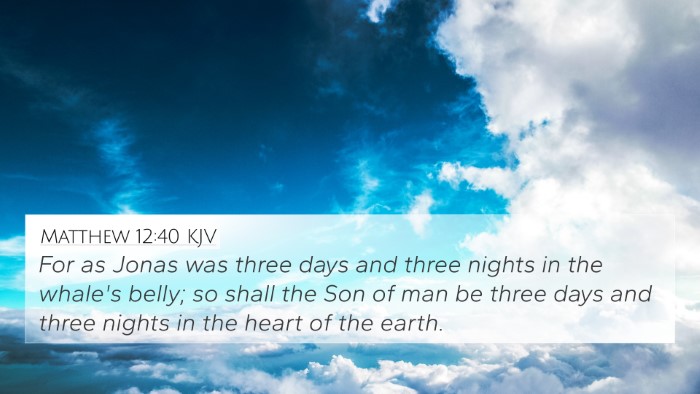Understanding Luke 11:30
Luke 11:30 states: "For as Jonah was a sign to the Ninevites, so also the Son of Man will be to this generation." This verse serves as a significant declaration about the prophetic role of Jesus Christ, drawing a parallel between His mission and the mission of the prophet Jonah. The following insights are drawn from public domain commentaries by Matthew Henry, Albert Barnes, and Adam Clarke to elucidate the meaning of this scripture.
Context of Luke 11:30
In Luke chapter 11, Jesus is addressing the people of Israel, who are seeking signs and wonders. His statement about Jonah is meant to illustrate the nature of His own work and the stubborn attitude of the people.
Meaning of Jonah's Sign
According to Matthew Henry, Jonah's experience in the belly of the great fish was a miraculous ordeal that served as a sign of God's mercy and judgment. Henry points out that Jonah's eventual preaching to the Ninevites led to their repentance, illustrating that even the most unlikely people (like the Gentile Ninevites) could respond positively to God’s message. Likewise, Jesus is saying that His presence and works should compel the generation he speaks to toward faith and repentance.
Albert Barnes adds that Jonah’s sign was not solely about a miraculous act but also about the message that Jonah delivered. The Ninevites recognized their sin and turned from it. Likewise, the Son of Man calls for repentance from sin, and His death and resurrection are the ultimate signs of God’s truth and love.
Adam Clarke emphasizes that the typological relationship between Jonah and Jesus illustrates the depth of Jesus' identity. Just as Jonah was sent to a foreign people, Jesus was sent to a Jewish audience who often rejected Him. Clarke notes that Jesus’ resurrection can also be viewed as the ultimate sign, paralleling Jonah's deliverance from the whale.
Cross-References for Further Study
- Matthew 12:39-41: Jesus references Jonah, indicating that the men of Nineveh will rise up in judgment against those who do not believe in Him.
- Jonah 1:17: The verse recounts Jonah being swallowed by the great fish, serving as the initial sign of God's intervention.
- John 3:17: Highlights the purpose of Jesus’ advent, echoing the theme of salvation rather than condemnation.
- Luke 13:34: Jesus laments over Jerusalem, expressing His desire to gather the people like a hen gathers her chicks.
- Acts 2:22-24: Peter connects the life, death, and resurrection of Jesus as the fulfillment of prophetic scripture, akin to Jonah's message.
- Romans 10:9-10: Paul emphasizes confessing Jesus as Lord, a direct call to the response that Jesus sought from His generation.
- 1 Corinthians 15:4: Paul affirms the resurrection of Christ which serves as the ultimate sign, similar to Jonah’s emergence from the fish.
- Colossians 1:27: Speaks of Christ in us, emphasizing the transformative aspect of responding to Christ's work in a manner similar to how Ninevites responded to Jonah's message.
Thematic Connections
Luke 11:30 invites us to explore several major themes found throughout scripture:
- Repentance: Central to Jonah’s narrative as well as Jesus’ ministry; both call for a turning back to God.
- Judgment: The Ninevites faced judgment despite their wickedness, and likewise, the generation of Jesus stands in jeopardy for their unbelief.
- Signs and Wonders: The significance of signs in God’s communication with humanity is a recurrent motif; Jesus and Jonah both serve as signs.
Cross-Referencing Biblical Texts
To deepen the understanding of Luke 11:30, cross-referencing with other scriptures is invaluable. Utilizing tools like a Bible concordance, a Bible cross-reference guide, or comprehensive Bible reference resources can illuminate connections between verses.
For instance, understanding the parallels between Jonah’s mission and the apostles’ exchange with modern Jewish leaders can provide insight into why Jesus emphasizes the Ninevites’ response versus His own people’s rejection. Such cross-reference study helps in linking Bible scriptures and cross-referencing Bible study methods effectively.
Conclusion
Luke 11:30 is not just a historical reference to Jonah; it is a profound invitation to reflect on the call to repentance and recognition of Jesus as the Messiah. By examining it through the lens of cross-referencing biblical texts and understanding the connections between various scriptures, we impact our spiritual insight and strengthen our understanding of God’s message throughout His Word.







